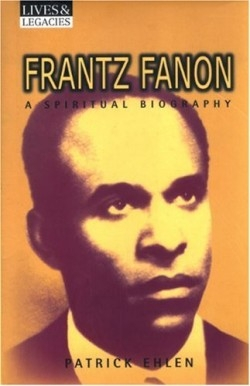Frantz Fanon
A Spiritual Biography
Fanon probably doesn’t belong in the same pantheon as Christ or Gandhi, as Ehlen alludes to in the opening chapter of his book. The man and his ideas, however, certainly deserve more consideration than they are accorded today.
Fanon, a native of Martinique who made his name in France and Algeria, brought the power of clinical psychology to the issues of colonialism. Ehlen writes biography in the old style of a Prescott or Plutarch, telling the reader countless, almost gossipy, details about Fanon. It’s a style that’s a little unsettling to readers used to traditional modes of biography or history, yet, it offers, in the space of a single anecdote, many words’ worth of glimpses into Fanon.
One telling example: When Fanon decided to leave Martinique to study in France, he had no compunction about stealing from his own mother to finance his trip. The ends outweighed the means, in his estimate.
In France, he quickly grew disenchanted with Paris. There were too many black people, and he felt that he was accorded the same second-class treatment as his dark brothers. So he traveled to eastern France. There, however, he quickly found that he had exchanged the anonymity of being just another black victim of racism for the false glory of being treated as an exotic.
After his training as a psychologist was completed, Fanon was sent to Algeria, to a rural mental hospital. There, he confounded the established mental health community by freeing the inmates from straitjackets and isolation wards.
Freedom, he felt, was a twofold process: First the body must be liberated, then the mind stood a better chance of freeing itself from illness. In his most famous work, The Wretched of the Earth, Fanon articulated a brilliant explanation of the wide gulf between how the oppressed and the oppressor perceived the same circumstances. Where the colonialist saw the culture, civilization, and graces brought to the colony, the colonized saw the paternalism and destruction of traditional society. Until the colonized were free of the bonds of colonization, they would never be able to participate as healthy beings in the world.
During the Sixties, Fanon’s works were cited, often by those with only a cursory understanding of them, as gospel truths of liberation movements from college campuses to boiling jungles. Yet today he is barely known. Ehlen is to be praised for bringing this forgotten intellectual warrior back to life.
Reviewed by
James Abraham
Disclosure: This article is not an endorsement, but a review. The publisher of this book provided free copies of the book to have their book reviewed by a professional reviewer. No fee was paid by the publisher for this review. Foreword Reviews only recommends books that we love. Foreword Magazine, Inc. is disclosing this in accordance with the Federal Trade Commission’s 16 CFR, Part 255.

